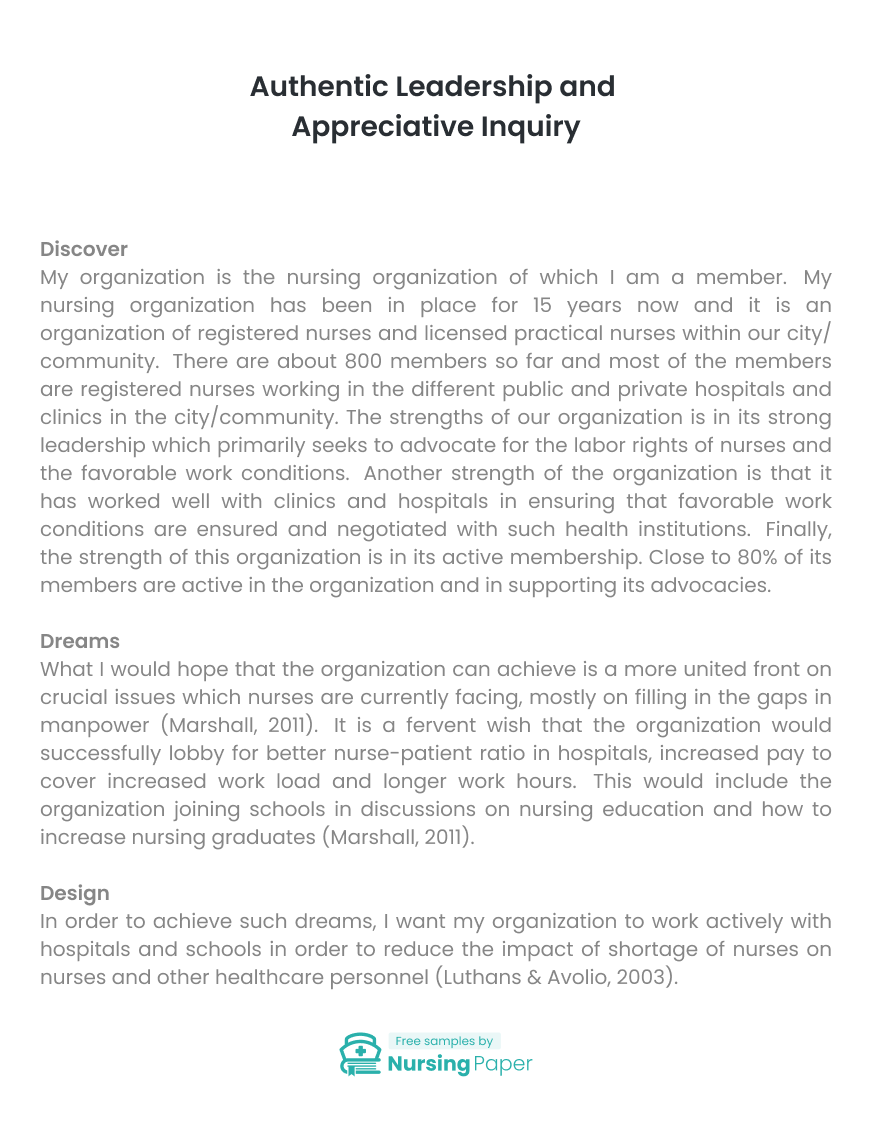
Authentic Leadership and Appreciative Inquiry
Discover
My organization is the nursing organization of which I am a member. My nursing organization has been in place for 15 years now and it is an organization of registered nurses and licensed practical nurses within our city/community. There are about 800 members so far and most of the members are registered nurses working in the different public and private hospitals and clinics in the city/community. The strengths of our organization is in its strong leadership which primarily seeks to advocate for the labor rights of nurses and the favorable work conditions. Another strength of the organization is that it has worked well with clinics and hospitals in ensuring that favorable work conditions are ensured and negotiated with such health institutions. Finally, the strength of this organization is in its active membership. Close to 80% of its members are active in the organization and in supporting its advocacies.
Dreams
What I would hope that the organization can achieve is a more united front on crucial issues which nurses are currently facing, mostly on filling in the gaps in manpower (Marshall, 2011). It is a fervent wish that the organization would successfully lobby for better nurse-patient ratio in hospitals, increased pay to cover increased work load and longer work hours. This would include the organization joining schools in discussions on nursing education and how to increase nursing graduates (Marshall, 2011).


Design
In order to achieve such dreams, I want my organization to work actively with hospitals and schools in order to reduce the impact of shortage of nurses on nurses and other healthcare personnel (Luthans & Avolio, 2003). This would include my organization lobbying government agencies and legislative bodies for these institutions to increase funding for health services in order to allow for the hiring of more nursing personnel. With adequate nursing personnel in hospitals, the nurse-patient ratio can be better managed and long work hours would be avoided.
Deliver
I would be doing it by suggesting during meetings within the organization that we write to our congressman and other government agencies (Luthans & Avolio, 2003). This letter shall state our desires for increased funding on health services.
Authentic leadership complements appreciative inquiry as appreciate inquiry helps promote a participative position, not just for positive stories from work, but also in terms of how workers relate to other workers and fellow researchers (Schall, Ospina, Godsoe, & Dodge, 2012). Authentic leadership commits to personal journeys in order to secure authenticity in leadership (Avolio & Gardner, 2005). It is also a type of leadership which seeks feedbacks from members being led; it seeks mentorship from other authentic leaders (Kerfoot, 2006; Mijales, Baxley, & Bond, 2013). Authentic leadership connects strongly with values and actions, and it works hard to build relationships (Kerfoot, 2006). My personal experiences with authentic leadership relate to a leader I had who made personal knowing of his staff a primary aspect of his leadership. He also did his best to apply ethical practices in his leadership (Fawcett, et al., 2001). He also considered facts and measurable outcomes (empiric knowing). He drew on his personal moral values. He also considered his perception of the needs of the patient (aesthetic knowing (Fawcett, et al., 2001).

1. Avolio, B. J., & Gardner, W. L. (2005). Authentic leadership development: Getting to the root of positive forms of leadership. Leadersh. Q., 16(3), pp. 315–338.
2. Fawcett, J., Watson, J., Neuman, B., Walker, P. H., & Fitzpatrick, J. J. (2001). On nursing theories and evidence. Journal of Nursing Scholarship, 33(2), 115-119.
3. , K. (2006). Authentic leadership. Nurse Leader. 24(2), 116-117.
4. Luthans, F., & Avolio, B. J. (2003). Authentic leadership: A positive developmental approach. In
5. K.S. Cameron, J.E. Dutton, R.E. Quinn (Eds.), Positive Organizational Scholarship, Barrett-Koehler: San Francisco, CA. pp. 241–261.
6. Marshall, E. S. (2011). Transformational leadership in nursing: From expert clinician to influential leader. Springer Publishing Company: NYC, NY.
7. Mijares, L., Baxley, S. M., & Bond, M. L. (2013). Mentoring: A concept analysis. Journal of Theory Construction & Testing, 17(1), 23-28 6p.
8. Schall, E., Ospina, S., Godsoe, B., & Dodge, J. (2004). Appreciative narratives as leadership research: Matching method to lens. Advances in appreciative inquiry, 1, 147-170.



The download will start shortly.

The download will start shortly.
 Subject:
Nursing
Subject:
Nursing  Number of pages: 4
Number of pages: 4  Subject:
Nursing
Subject:
Nursing  Number of pages: 4
Number of pages: 4  Subject:
Nursing
Subject:
Nursing  Number of pages: 2
Number of pages: 2  Subject:
Health and Social Care
Subject:
Health and Social Care  Number of pages: 3
Number of pages: 3  Subject:
Nursing
Subject:
Nursing  Number of pages: 21
Number of pages: 21  Subject:
Nursing
Subject:
Nursing  Number of pages: 4
Number of pages: 4  Subject:
Nursing
Subject:
Nursing  Number of pages: 3
Number of pages: 3  Subject:
Medicine
Subject:
Medicine  Number of pages: 4
Number of pages: 4  Subject:
Nursing
Subject:
Nursing  Number of pages: 2
Number of pages: 2  Subject:
Health and Social Care
Subject:
Health and Social Care  Number of pages: 3
Number of pages: 3  Subject:
Nursing
Subject:
Nursing  Number of pages: 5
Number of pages: 5  Subject:
Nursing
Subject:
Nursing  Number of pages: 5
Number of pages: 5  Subject:
Medicine
Subject:
Medicine  Number of pages: 2
Number of pages: 2  Subject:
Health and Social Care
Subject:
Health and Social Care  Number of pages: 9
Number of pages: 9  Subject:
Medicine
Subject:
Medicine  Number of pages: 9
Number of pages: 9 
